Find your way
Follow us on Facebook

Follow us on Facebook

This is an old revision of the document!
Involving people from various background and ages into the Tour requires a structured action plan. Communication channels and tools have to be adapted accordingly.
A specific attention should be paid to involving people with fewer opportunities, using the connections your organization has with other local social organizations that support them on a regular basis.
In most cases, the enrollment process includes:
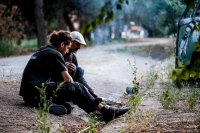 These interviews are a great opportunity to inform the candidates about the experience in a more specific way, to connect with them and to build trust. They enable you to appreciate what drives them and what could be a challenge for them, as they express their motivations but also some of their doubts, fears, or personal issues (you can read more on this topic below).
These interviews are a great opportunity to inform the candidates about the experience in a more specific way, to connect with them and to build trust. They enable you to appreciate what drives them and what could be a challenge for them, as they express their motivations but also some of their doubts, fears, or personal issues (you can read more on this topic below).
As for any project, you may adapt this procedure and timeframe to your specific context, as long as you make sure that the recruiting process will be open and transparent and will avoid any discrimination based on race, religion, sexual orientation or political opinion.
We believe that the success of the Tour strongly relies on the quality of preparatory meetings organized by each partner organisation within 2 months before the Tour.
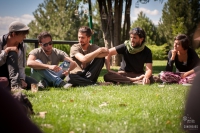 The meetings’ schedule and objectives will depend on the participants’ profile and on the Tour's objectives and specific content. They should guide the participants in:
The meetings’ schedule and objectives will depend on the participants’ profile and on the Tour's objectives and specific content. They should guide the participants in:
In addition to these face-to-face meetings, social networks, online platforms and softwares can be used to ease the exchange of ideas, knowledge and discoveries between participants, especially when them come from different provinces or countries.
From our experience, we suggest you do the following:
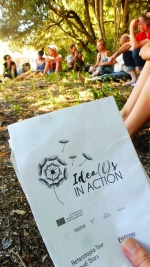 At first, you should make sure that selected participants are right for the Tour and that the Tour is right for them, which means that you need to ensure that all relevant information about the project has been well communicated and understood by the candidates.
At first, you should make sure that selected participants are right for the Tour and that the Tour is right for them, which means that you need to ensure that all relevant information about the project has been well communicated and understood by the candidates.
As described under the recruitment process, applicants need to get access to all the detailed information on the Tour’s values, its general objectives (the change you want to achieve together) and its more specific pedagogical objectives (the areas in which the participants can develop their personal and professional abilities).
We believe the first preparatory session should be dedicated to re-visit these aspects of the project, linking the Tour's objectives to the participants’ expectations and to their personal learning objectives. From there, the non-formal educational methodology should be explained and preferably also “tested out” with the participants, this way they get more familiar with the types of activity they will experience during the Tour.
Remember that, for plenty of people, the Tour will be their first time experiencing non-formal education, and sometimes their first time camping and living outside the comfort of a house. During the first preparation meeting, it is crucial to explain them what they should expect about logistics and infrastructure, which are the roles and tasks they will have to take on regarding campground/accomodation management, which ones will be the non-flexible rules they will have to respect (e.g. if it is forbidden to drink alcohol, if there is a restriction on smoking, etc.). This way you make sure they all know “what they have signed up for”.
Missing or incomplete information on those topics -or misunderstanding from the participants- may cause discomfort, frustration, loss of trust and sometimes drop-out from the project. The clearer your first meeting, the better for everyone involved. If someone realizes they don't fit into the project (because he/she realizes that it doesn't meet his/her expectations or needs) it will be the right moment for them to step back.
Then, we recommend you to sign with each participant a Learning Agreement in which you lay down all pedagogical and practical information shared, and in which they declare to commit to the successful implementation of the project as a whole. This should prevent you from many problems that arise from misunderstandings.
As soon as you made sure that the participants know what they are getting into (and are still willing to join the Tour), you can address their needs, fears and expectations.
Analyzing those in details will help adapt some logistical or practical arrangements, to better organize the activity schedule of the Tour and to better adjust it to the participants’ profiles. For this reason we suggest you assess these topics from an early stage of the preparation (for example during the second meeting), so the collected information can be put into use in a timely fashion.
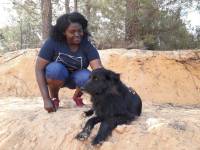 A Tour will hopefully represent a challenge for the participants. It might move them emotionally, bring
old memories to the surface, question some beliefs, values and behaviors, have them face some of their physical or personal limits.
A Tour will hopefully represent a challenge for the participants. It might move them emotionally, bring
old memories to the surface, question some beliefs, values and behaviors, have them face some of their physical or personal limits.
Questioning the aforementioned topics will be strenuous for many people. From our experience, we suggest you the following to support them in their effort to challenge themselves.
* Use guiding questions for reflection:
The participants might find it difficult to answer a direct questions, such as “what are your expectations?”. They might give you superficial answers, or answers they think you are expecting from them. Try to use more specific questions, make them tell you about something personal they have experienced or something that is more linked to their daily life, or make up a hypothetic situation and ask them how they would act or react in that situation.
* Consider any kind of expression valuable:
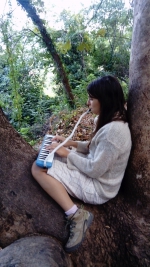 Sometimes we are more comfortable expressing ourselves in different ways than words. Let the participants choose their own way of expression (drawing, miming, dancing, singing etc.).
Storytelling is also an effective way of thinking about values, goals, obstacles and fears – the participants may also talk about “someone else”, so they feel safer when talking about such personal topics.
Sometimes we are more comfortable expressing ourselves in different ways than words. Let the participants choose their own way of expression (drawing, miming, dancing, singing etc.).
Storytelling is also an effective way of thinking about values, goals, obstacles and fears – the participants may also talk about “someone else”, so they feel safer when talking about such personal topics.
* Start with individual reflection, followed by a small group discussions (max 2-4 participants/group):
Individual reflection makes participants practice self-reflection without being influenced by other people's answers and without feeling judged about their answers.
After a moment of reflection on their own, sharing in small groups helps the participants think about possible fears and expectations they haven’t thought about, and will also help to create a sense of group by sharing common concerns and objectives.
At the end we recommend that the participants voluntarily share their answers with the whole group, so facilitators can take them into consideration during the Tour and provide answers to some doubts and fears. Always give participants the option to share what they feel to share! Keep in mind that to facilitate sharing, building a trusting relationship and a safe atmosphere will be essential.
* Induce the “Reflect on fears and expectations” session only after participants have a clear understanding about the objectives and detailed program of the Tour, and about its logistic aspects:
Addressing fears and expectations at the right moment of the preparation will help to avoid the creation of false expectations. Besides, it will also help the participants to think about and describe specific fears and expectations, not only general ones.
Don’t forget to ask the participants about their food diet, medical or other specific needs as well! Remember that some information of those kind can also be withheld by participants, because they are afraid not to be selected or just embarrassed by it. Make sure you have established a trusting relationship with participants so they feel comfortable to sharing sensitive information with you, and you can explain them in details why it is necessary for their own sake that this information is shared with the organizers.
* Keep track of the process
The Participants' needs, fears and expectations may change overtime. We recommend to review them regularly, especially during intermediate evaluation(s) and final evaluation of the Tour. It will allow you to keep track of the process and will help the participants to be more aware of the change they are going through. (You can read more on this topic in chapter 5.3 “Activities/Schedule” and chapter 6. “Follow-ups and dissemination”). }
The preparatory meetings will also be the opportunity to accustom the participants to the new environment in which they will evolve along the Tour. In practice, it will be the right time for you to:
A voice that counts within a diverse group is a feeling that should be built from the very beginning. It will be the core reason why people get involved in the Tour: because they feel listened and welcome to express themselves, whatever they have to say. From a feeling of social isolation, that might be familiar in their ordinary life, here they will feel part of and acknowledged by a group, which may feed their will to take action and become the protagonists of their collective adventure.
While encouraging them to express themselves and actively engage into the project, we recommend to introduce them to community living and intercultural dialogue, so that they can have an idea of what it means in practice and what type of efforts and mindset it requires.
Be as creative as possible to deal with these topics. Alternate between debates, role play, photo language, tabletop exercises, brainstorming, vary the size of the working groups, build on the prior experience of the participants… The more you will engage them in the sessions, the more they will understand the issues at stake and make something out of the experience.
Take time to define together what may contribute to a successful experience regarding community living and encourage them to imagine how they could put it into practice during the Tour. From our experience, we suggest to bring to light at least the following:
Introduce them to the concept of Artful Participation (which consists in asking oneself: “Is my role and attitude in the group the most helpful and meaningful at the moment?”) and encourage them to take into consideration the consequences of their choices and behaviors on the group.
Now that they know each other a bit more and that they feel more comfortable to express themselves in front of each other (sharing their interests, ideas and opinions), you can start dealing with social innovation with the participants and explore the thematics they will discover and investigate during the Tour.
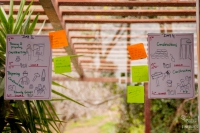 What does social innovation means to them? Where do they stand regarding ecology, sustainable development, permaculture, the transition movement, alternative pedagogies, technologies? What makes sense for them, what clicks with them and what doesn't? Have they ever heard about “ecological footprint” or “popular education” before?
What does social innovation means to them? Where do they stand regarding ecology, sustainable development, permaculture, the transition movement, alternative pedagogies, technologies? What makes sense for them, what clicks with them and what doesn't? Have they ever heard about “ecological footprint” or “popular education” before?
Have a look at the Tour's program together again: explain the general context in the area the Tour will take place (meaningful trends, politics, historical facts…), go deeper and give details about each step: the projects you will visit during the journey, the people you will meet, the workshops you will do, etc.
Likewise, analyze the living conditions offered during the Tour from a critical point of view: To which extend do they differ from the participants' daily routine? What questions does it bring about? What about food diet? consumption habits? housing? etc.
Encourage the participants to share their interests, experience, knowledge, doubts and questions regarding the main topics the Tour is about. Which ones appeal them enough to dive deep into? Under which perspective have they formed their current understanding towards each of them? Does someone in the group have a previous experience or a specific knowledge about a topic you are talking about? Could you arrange a moment for this knowledge to be shared between participants (either in the preparation phase or during the Tour)?
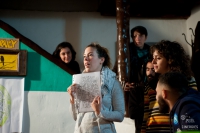 Make sure to let each person talk (some participants might be shy and some other a bit too talkative…) and vary as much as possible your pedagogical approach from a topic to another. For example, you can propose a film-screening to address the topic “A”, a collaborative mind-map to deal with the topic “B”, a photo-language to talk about the topic “C”, etc.
Make sure to let each person talk (some participants might be shy and some other a bit too talkative…) and vary as much as possible your pedagogical approach from a topic to another. For example, you can propose a film-screening to address the topic “A”, a collaborative mind-map to deal with the topic “B”, a photo-language to talk about the topic “C”, etc.
The challenge will be to build a common understanding of the most important concepts and thematics inside your group, while still feeding the interest of those who already know about those topics. To keep their interest alive and rise their curiosity, look at each topics from various perspectives and encourage community interaction, constructive debates, knowledge-seeking and critical thinking. It will fuel the participants' desire to learn more and create a fertile ground for the group to “observe and absorb” the content.
Heterotopia Tours should be inclusive and designed in a way that (young) people with fewer opportunities can be part of the adventure and feel as legitimate as other people. But how to turn this wish into reality?
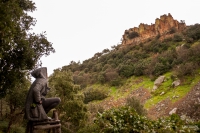 By “young person with fewer opportunity” we mean a young person who, without adequate support provided, could not be able to participate in an opportunity like the Heterotopia Tour for various reasons: for limited economic resources, for difficulties with learning, for mental or physical barriers, because he's marginalized due to ethnic or cultural differences or due to a stint in prison etc.
(For a more specific definition on young people with fewer opportunities click here: https://www.salto-youth.net/tools/otlas-partner-finding/help/young-people-with-fewer-opportunities/.)
By “young person with fewer opportunity” we mean a young person who, without adequate support provided, could not be able to participate in an opportunity like the Heterotopia Tour for various reasons: for limited economic resources, for difficulties with learning, for mental or physical barriers, because he's marginalized due to ethnic or cultural differences or due to a stint in prison etc.
(For a more specific definition on young people with fewer opportunities click here: https://www.salto-youth.net/tools/otlas-partner-finding/help/young-people-with-fewer-opportunities/.)
The most important thing when deciding about whether you should involve youth with fewer opportunities in the Tour is to evaluate honestly if you would be able to provide appropriate support to those young people before, during and after the Tour. In case you are not sure about it, we suggest you not to do it, or to involve a person with expertise who can help you facilitate their full integration in the project.
Even though the people with fewer opportunity will go through the same process than the other participants and attend the same preparatory sessions, some aspects will need additional attention when supporting them:
* Better understanding the (young) person and their reality
The most essential part of the preparation will be to get to know the (young) person as much as possible. Apart dedicating enough time to them, the youth worker(s) (in the role of facilitator(s)) should gather additional information and discuss with other social workers or educators who have already been following their path.
Moreover, the tutor (in case of minors), the family or other reference persons who are close to the participant should be informed and involved, given that their opinion can influence his or her dedication to the project.
* Investing more time and energy in establishing a trust-relationship, while establishing clear roles and dynamics between you and them
The quality of the support you will provide, and its impact on the long term, will depend on the quality of the relationship you will establish between you and the young person. It is decisive they trust you, but make sure there is no misunderstanding between friendliness and being friends. The role of the supporting person in the life of the participant has to be clear. It is important to lay done some guidelines on how you work together in order to avoid false expectations, delusion and the loss of trust. Make clear that your support is related to self-development, to personal and professional growth through learning, and that you can give guidance towards other supports if needed.
* Being responsive and available
(Young) people with fewer opportunities might require more of your time than other participants. They need a reference person who guides them, someone they trust and get attention from, and they might not have one in their life. Don’t refuse this additional attention from them but remember to be clear about when you are available and in which cases!.
Being active in communication, responding to them within reasonable time, and contacting them when they have been “silent” for a while contributes to build a relationship and also to avoid drop-out.
In case you understand that they have special needs that are beyond your capacities or competencies, don't hesitate to look for help: guide and accompany them to the right person/service.
* Implementing additional activities to reinforce preparation
(Young) people with fewer opportunity's motivation and commitment has to be strengthen during the preparation phase. It will most probably be necessary to implement additional preparatory activities and meetings than usual to support them..
Besides creating a stronger base for the experience, the more frequent meetings can help the youth workers to notice right away if “something is not going well”: if the participant is having doubts, if he or she is having some difficulties in their life that can risk their participation, if they behave in an alarming way etc. Timely identified obstacles can help to avoid or mitigate problems!
More frequent meetings will also give possibility to work on a more solid relationship built on respect and honesty which is essential to prevent problems and conflicts during the Tour.
* Preparing the other participants
As said before, it is fundamental to build the tolerance and acceptance level of the participants before the tour in order to avoid discrimination and eventual exclusion. Raising the awareness of the participants about diversity and improving the level of their emotional intelligence contribute to prevent conflicts emerging from prejudices. The rule that no offensive and discriminatory language is allowed at all has to be applied to the whole group.
In case you involve young people who are former drug or alcohol addicts, you should consider restricting the alcohol consumption and clearly stating “no drugs” as a rule of the Tour. (Note: Alcohol can be a sensitive issue – the reason of the rule has to be always explained and accepted by the group, and in the meantime a possible request of the young person not to share his personal information on the matter should be also respected. Building trust and an open dialogue in a safe space is more than needed in these cases.)
* Closer monitoring during the Tour
During the Tour the same approach should be used as during preparation: constant monitoring and observation, alternating one-to-one meetings and national group meetings can help youth workers to understand the support needed. Careful! It doesn’t mean that you always have to be in “on the back” of the participant. Observe them from a distance, try to see how they naturally behave, act and react, ask feedback frequently and intervene only when it is necessary.
We suggest to ask support from the other youth leaders as well: more eyes mean more observations and they can also give you professional opinion when needed.
* Support after the Tour: probably the most important part of the process
During the Tour, the participants will most probably experience something they enjoy. They will hopefully live an experience where they feel safe in the group and in the place, and where they create strong emotional connections. It might be that after this experience they have to go back to a reality that they’ve been trying to escape from.
Youth workers have the responsibility to re-integrate participants to the “ordinary life”, to guide them on how they can change their own reality into a new one they would like to be part of, using the new skills and knowledge they have gained during the Tour. Ignoring this phase of support can have as a consequence that participants fall into depression and feel a sense of abandonment which can result in refusal of other future opportunities.
Involve participants in other activities, direct them towards new opportunities, help them to find the support they are looking for in case you cannot provide it. Like it or not, you will be a reference point for them till long after the Tour – and that is the beauty of it!